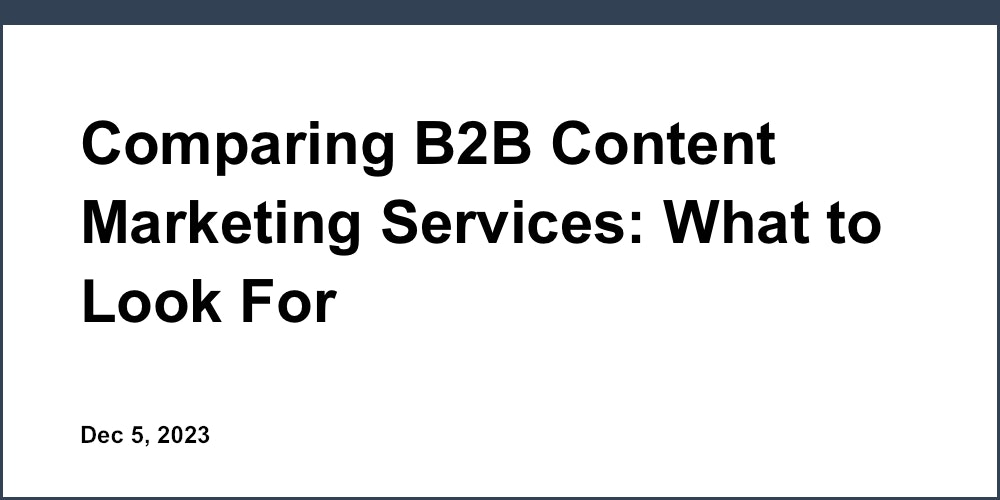Finding an effective B2B content marketing partner is a common challenge.
But with the right guidance, you can identify the key factors to evaluate when comparing agencies.
In this article, we will discuss critical considerations around content expertise, talent management, pricing models, goal alignment, and more to help you select the best fit for driving content performance and conversions.
Introduction: The Growing Need for Effective B2B Content Marketing
B2B companies are increasingly realizing the importance of content marketing for driving business growth. Studies show that high-quality content fuels every stage of the buyer's journey - from initial research to final purchase decision. However, producing engaging, informative content in-house can be challenging. Partnering with specialized B2B content marketing agencies provides many advantages.
The Rising Prominence of Content in the B2B Buyer's Journey
- Recent research indicates that 95% of B2B buyers consume multiple pieces of content across various formats during their buyer's journey. This demonstrates the influential role content plays.
- High-value content also helps convert web visitors into leads at a 55% higher rate compared to those without quality content.
- Ultimately, effective content marketing leads to increased sales, higher customer retention, and overall business growth. Producing content should be a priority.
Common B2B Content Marketing Challenges
Many B2B companies struggle to create sufficient high-performing content in-house due to:
- Time constraints: Content creation is very time-intensive. Many teams lack dedicated writers.
- Budget limitations: Producing engaging content requires a financial investment many cannot afford.
- Content expertise: In-house staff often lack specialized skills needed for B2B content like SEO optimization.
These roadblocks mean critical content opportunities are missed.
The Benefits of Outsourced Content Marketing Services
Partnering with an external content agency provides:
- Talent and skills: Access to dedicated content specialists like writers, designers, strategists.
- Increased output: An ability to produce more content more efficiently.
- Quality and consistency: Agency expertise results in higher-performing content.
- Flexibility: Scale production up and down as needed.
This lifts a burden off internal teams while fueling business growth through content.
How do you measure the impact of B2B content marketing?
Measuring the success of a B2B content marketing strategy can seem daunting given the many metrics available. However, focusing on a few key performance indicators (KPIs) is crucial for understanding content effectiveness and areas for optimization.
When developing a measurement plan, consider metrics across three categories:
Engagement
Engagement metrics indicate how well your content resonates with your target audience. Useful metrics include:
- Time on page
- Bounce rate
- Click-through rate
Tracking engagement helps determine content quality and topics to cover in future content. For example, content with high time on page signals readers find it useful.
Conversions
Conversion rate is the percentage of visitors that take a desired action. This demonstrates how well your content moves readers along the buyer’s journey. Goals vary by business type but may include:
- Email sign-ups
- Content downloads
- Sales inquiries
Setting conversion goals and tracking rates over time is essential for proving content ROI.
Organic Performance
Finally, organic traffic and rankings reveal how search engines and users value your content. Key organic metrics:
- Organic visits
- Keyword rank
If new content quickly rises in rank and brings additional organic traffic, it indicates high-quality, useful information.
Regularly evaluating metrics across these three categories provides a comprehensive view into content effectiveness. Over time, use the insights to refine content production and distribution for maximum business impact.
What makes good B2B content?
Creating quality B2B content starts with understanding your target audience. What information do they need to make informed purchasing decisions? What problems can your product or service solve for them?
The best B2B content is:
- Relevant - Directly addresses customer pain points and goals. Focuses specifically on their industry and use cases.
- Educational - Shares expertise and teaches customers something new. Goes in-depth on industry topics and best practices.
- Actionable - Provides clear steps and takeaways customers can implement. Outlines the direct benefits of working with your company.
To inspire loyalty in your audience, content should position your brand as an invaluable resource. Rather than overt self-promotion, subtly showcase how your offerings uniquely meet customer needs.
Share real customer success stories and case studies. Highlight your commitment to continuous innovation and improvement. Demonstrate deep care and understanding of customer challenges.
Content that educates, empowers and builds trust drives meaningful engagement over time. Put the audience first, understand their world, and craft content that pulls them further into your orbit.
How do I choose a content marketing agency?
Choosing the right content marketing agency is crucial for the success of your content strategy. Here are some key things to look for when evaluating B2B content marketing service providers:
Focus on expertise and experience
Make sure the agency has expertise in your particular industry. They should demonstrate a deep understanding of your target audiences, their challenges and aspirations, competitor landscape, industry trends and terminology. This enables them to create authoritative, helpful and engaging content.
Agencies with proven experience creating successful content strategies will likely deliver better results. Ask to see case studies and examples that are relevant to you.
Emphasis on quality over quantity
Avoid agencies who focus solely on pushing out as much content as possible without considering optimization and refinement. High quality, insightful content that truly resonates with your audience is more valuable. Look for strategic consultation on topics and distribution plans, not just writing articles to hit a number.
Pricing and services
The rates should align with the value being provided. Be wary of services that seem unsustainably cheap. Also consider the breadth of services offered. Can they fully execute integrated strategies spanning research, creation, distribution and analytics? Or do you need to piece multiple vendors together?
Strong track record
Look at existing content from prospective agencies. Is it well-written, insightful and optimized for discovery and sharing? Talk to their clients. Social proof in online reviews also provides confidence regarding capabilities.
By evaluating expertise, priorities, services and case studies, you can determine if an agency is equipped to deliver on your content marketing vision. The right partner makes all the difference.
sbb-itb-bdda4a4
What are the 12 major differences between B2B and consumer marketing how would these differences affect formulating a B2B strategy?
Understanding the key differences between B2B and B2C marketing is critical when formulating an effective B2B marketing strategy. Here are some of the major differences to consider:
Target Audience
B2B buyers are professional purchasers that make buying decisions on behalf of a company. They tend to be more rational, analytical, and focused on functionality. B2C buyers make personal purchasing decisions based on their own needs or wants.
Buying Cycle
The B2B buying cycle tends to be longer and more complex, involving multiple stakeholders. B2C purchases tend to be smaller, simpler, and made by individuals.
Purchasing Habits
B2B buyers make planned, well-researched purchases tied to company objectives. B2C buyers often make spontaneous, emotionally-driven purchases.
Relationship Building
Developing relationships with key decision makers is critical for B2B sales. B2C marketing rarely requires personal relationship building.
Advertising Approach
B2B marketing uses targeted, educational messaging to reach niche audiences. B2C marketing uses broader emotional appeals targeting mass consumers.
Decisions Based on Logic
B2B buyers make logical, well-informed decisions based on business needs. B2C buyers make more intuitive, emotionally-driven purchases.
Price Sensitivity
B2B buyers are often less price sensitive since products directly impact business operations. B2C buyers tend to be more price conscious.
In summary, B2B marketing strategies should focus on targeted lead nurturing through content and developing strong relationships with stakeholders. Messaging should focus on tangible business benefits rather than emotional appeals. Understanding these key B2B and B2C differences allows marketers to craft resonant messaging that moves B2B buyers through the complex decision journey.
Key Factors to Evaluate When Comparing B2B Content Marketing Agencies
Selecting the right agency partner is crucial for success with your B2B content marketing strategy. When comparing potential partners, focus on a few key factors to determine the best fit.
Content Creation Expertise and Services
The core of any content marketing agency's offerings is the ability to produce high-quality content tailored to your goals. Assess expertise across different content types like:
- Long-form articles and blog posts
- Short-form social media posts
- Research reports and ebooks
- Videos, podcasts, and other rich media
Seek out custom offerings vs. one-size-fits-all content. The agency should ask thoughtful questions to understand your target audiences, objectives, and messaging before determining the best formats and topics.
Industry expertise also matters. Look for writers with experience in your field who can quickly get up to speed on key issues. An agency well-versed in your vertical can develop more insightful, targeted content.
Talent Sourcing and Ongoing Management
Understand how the agency sources and vets writers. Do they employ in-house talent or rely on a freelance network? How are writers matched to clients based on needs and expertise?
Ongoing relationship management is also important. There should be open communication channels between clients, writers, strategists/editors to enable quality assurance and continuity long-term.
Pricing Models and Scalability
Common models include per-word rates for à la carte content or monthly retainers covering a set number of blog posts, emails, etc. Consider current and future needs when selecting a structure. Can you easily scale production up or down?
Retainers allow better budgeting and planning if your company has regular content needs. But per-word purchases can make sense for intermittent projects.
Choose an agency able to grow with you. As your program matures you may produce more content spanning different formats and verticals. Ensure your partner can flex as needs change.
Evaluating these key factors will help you find the right B2B content marketing partner to create quality, impactful content fueling your strategy's success. The ideal agency not only writes stellar content but also understands your business to translate objectives into stories resonating with target buyers.
Choosing the Right Content Marketing Partner for Your Needs
Selecting the best content marketing agency to meet your business goals requires careful evaluation across a few key areas. Clarifying your objectives, understanding your audience, assessing content quality and compatibility, and prioritizing cultural fit are essential to finding the right partner.
Clarifying Your Goals and Buyer Personas
Before starting your search, clearly define your content marketing goals and target buyer personas. Ask questions like:
- What business objectives should the content achieve? Increase brand awareness? Generate more leads?
- Who are you trying to reach and influence with your content? What motivates your ideal customers?
Having clear answers helps assess if an agency properly understands your needs and can create content tailored for your goals and audience. Share detailed buyer personas and success metrics like lead generation targets with potential partners.
Evaluating Content Style and Tone Compatibility
Every brand has a unique voice. When comparing agency partners, assess if their style and messaging aligns with yours by reviewing content samples.
See if the language, tone, formatting, and design used in their materials matches your brand voice. Do they target the right personas? Does the content resonate with your values? The more compatibility you find, the easier it will be to work together.
Provide agencies detailed brand guidelines and samples of existing content that embodies your ideal voice and tone. This helps them mimic your style in new materials.
Prioritizing Cultural Fit and Communication
The best partnerships are built on shared values, transparency, and trust. Make cultural fit a priority by choosing an agency with:
- Shared commitment to ethics, quality, timeliness
- Responsiveness to feedback and change requests
- Proactive project updates and status reporting
- Tools enabling real-time collaboration
Open communication reduces delays from revisions and ensures both sides feel valued. Set clear expectations upfront through a detailed SOW. Build trust by giving candid progress feedback and listening to their recommendations.
The ideal agency relationship feels like an extension of your internal team. Use the evaluation tips above to find the content marketing partner that best fits your brand vision and business needs.
A Data-Driven Approach to Optimization and Performance Tracking
Taking a data-driven approach to content optimization enables B2B companies to continually refine and improve marketing content based on real user data and engagement metrics. By implementing processes to gather customer feedback, regularly reviewing content performance, and tracking key analytics, teams can identify poor-performing assets to revise or replace while doubling down on content that resonates best with buyers.
Implementing Processes to Continually Enhance Content
To optimize content over time, B2B marketing teams should establish structured workflows for continual review and refinement driven by both qualitative and quantitative inputs. Important steps include:
- Conduct periodic content audits to evaluate existing library health, identify content gaps, and determine outdated or underperforming assets to update or archive.
- Gather customer feedback via surveys, interviews, and reviews to capture first-hand qualitative insights into how content is resonating.
- Perform regular content reviews by pulling latest performance data and convening stakeholders from across teams to spot optimization opportunities.
- Set revision timelines for updating identified weak content on a quarterly or bi-annual basis to keep information fresh.
By institutionalizing processes for constant content checks and improvements, teams can ensure assets stay relevant, engaging, and aligned to evolving buyer needs.
Selecting and Monitoring Content Key Performance Indicators
To accurately gauge content efficacy, B2B companies should track key performance indicators (KPIs) tailored to business goals across the buyer's journey. Useful metrics to monitor include:
- Brand lift such as awareness, consideration, and preference metrics to quantify impact.
- Lead generation KPIs like form fills, CTA clicks, downloads, and email subscribers.
- Engagement analytics including time on page, scroll depth, clicks, and shares.
- SEO rankings to measure organic visibility and traffic.
Teams should determine the right mix of KPIs to highlight whether content is attracting, engaging, and converting target personas. By gathering this data and monitoring trends over time, organizations can catch drops in metrics to identify underperforming content.
Leveraging Data to Refine Content for Increased Conversions
By compiling engagement analytics and performance benchmarks for each piece of content, B2B marketing teams can determine optimal revision and optimization approaches. Key ways to act on these insights include:
- Double down on high-performing content by promoting assets driving significant traffic, conversions, and buyer engagement.
- Refine or replace poor-performing content that fails to rank or engage users based on data-backed insights into weak points.
- Strengthen personas and targeting by analyzing the specific buyer groups responding positively to different content types and subjects.
- Bridge content gaps where analytics point to user interest in related subjects without available content.
Continuous analysis of content metrics enables data-informed decisions on where to devote more resources vs. what requires rework or retirement to maximize ROI.
The Bottom Line: Investing in Specialized Support to Boost Content Marketing Impact
Reaping the Rewards of a Targeted Content Marketing Strategy
Partnering with a specialized B2B content marketing agency can help companies achieve significant gains in sales, pipeline growth, customer engagement, and brand awareness. By creating goal-aligned, persona-focused content, companies see higher lead conversion rates, reduced cost per lead, and expanded reach.
For example, targeted content creation support can help:
- Increase sales qualified lead conversion rate by 2x
- Reduce cost per lead by 30-40%
- Expand social media reach and engagement by 50%+
- Improve brand lift metrics by 40%+
The right content fuels the buyer journey at every stage, nurturing prospects into loyal customers. An agency with deep B2B expertise makes all the difference in realizing these rewards.
Maximizing Value Through a Custom-Fit Solution
Rather than a generic, one-size-fits-all approach, companies should select a content marketing partner that offers customized services tailored to their specific business goals, audiences, and KPIs.
Key factors that enable a custom fit include:
- Persona-based content framework: Content topics and angles personalized to buyer journeys
- Business goal alignment: Content strategy and metrics tied to pipeline and revenue targets
- Ongoing optimization: Continual A/B testing and feedback loops to refine approach
This targeted level of personalization delivers unmatched value and impact over time. And it allows brands to maximize ROI from content marketing spend.
The Key Ingredients for Content Marketing Success
When evaluating content marketing partners, the most pivotal criteria are:
- Subject matter expertise: Deep knowledge of your industry, category, and competitors
- Creative talent: Skilled writers and multimedia creators tailored to your niche
- Custom fit: Personalized services aligned to your business specifics
- Optimization rigor: Data-driven processes for continual testing and improvement
Checking these boxes sets the stage for effective content that moves metrics tied to pipeline targets and strategic goals. Partnering with the right agency brings specialized support critical for cutting through the noise to reach, engage, and convert high-value B2B audiences.




.png)








